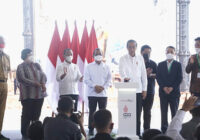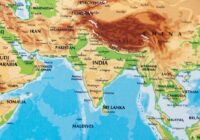The official results of the Indonesian presidential election, held February 14, will be released by the middle of this March. However, most preliminary estimates have identified Prabowo Subianto and his running mate Gibran Rakabuming Raka as the likely victors. They defeat rivals Ganjar Pranowo and Anies Baswedan with over 55% of the total votes.
Subianto is expected to continue the policies of the incumbent president, Joko “Jokowi” Widodo. (Jokowi is also the father of Gibran.) Since 2019, Prabowo has served as the Minister of Defense and helped Jokowi to run several military projects, including importing vaccines from China. Economic relations, for example, between Indonesia and China soared during the Jokowi era. The Indonesian Central Statistical Agency (BPS) noted that Indonesia’s trading partnership with China, which reached more than $130 billion in 2022, has increased significantly since 2014, which was the first year of the Jokowi era.
Prabowo and Gibran gave their victory speech in front of millions of supporters. Soon after, China shone the spotlight on Prabowo. Foreign ministry spokeswoman Mao Ning congratulated Prabowo and expressed hope that the relations between Indonesia and China would grow in the upcoming years.
I argue three things. First, Prabowo’s win is momentum for China, and the ties could continue to be more substantial. Second, Prabowo, who has a military background, will enhance the government’s relationship with the military sector. This could justify the criticism that Prabowo lacks knowledge about the economy. Third, Prabowo will likely cooperate with China’s international partners, mainly Russia.
Continuing Jokowi’s policies
Prabowo has long had solid ties with Jokowi. His posture and verbal statement during the presidential debates suggest his commitment to continue Jokowi’s programs.
Prabowo frequently stated that the development of downstream processing sectors (as opposed to raw material extraction), is his top priority policy. This is a continuation of the Jokowi administration’s outlook. Prabowo has emphasized the importance of nickel processing projects in Sulawesi and Maluku to Indonesia’s economy. “Nickel is an element needed by industries, and we have nickel, one of the largest [nickel reserves] in the world,” Prabowo said at the Trimegah Political and Economic Outlook 2024 event in Jakarta on January 31.
The nickel industry cooperates heavily with Chinese ventures. China is the main export destination of Indonesian nickel. In 2020, Jokowi’s government banned the exportation of raw nickel, encouraging Chinese firms to invest in nickel processing within Indonesia.
Before the downstream program, Indonesia’s nickel ore was mostly exported and sold for cheap on the international market. Jokowi and Prabowo’s bid to expand domestic processing seeks to keep more money within Indonesia and also to make Indonesia a base for electric vehicle battery manufacture. Prabowo hopes to expand the downstream sector into dozens of other commodities, such as bauxite, from which aluminum is extracted.
Related Reading
Rhetorically, Prabowo is against those who say that the downstream could not be beneficial to Indonesia. “People’s thinking is so messed up. I really don’t understand them,” he has remarked.
The new capital city of Nusantara, another of Jokowi’s signature projects, is a concern to Prabowo’s team. Continuing in Jokowi’s steps, Prabowo will accelerate the flow of investment into the city and engage China as the biggest partner.
Military expansion?
In 2021, Indonesia experienced the tragedy of the sinking of the KRI Nanggala 402 in the waters around Bali. China’s role in the situation was very significant. Chen Yongjing, military attaché of the Chinese embassy, deployed the tug Nantuo 195 and the Xin Dao 863 to assist the Nanggala. Prabowo, as minister of defense, thanked China for the assistance at the 15th Association of Southeast Asian Nations Defense Ministers Meeting.
Prabowo has frequently communicated with China. In December 2019, for example, Prabowo embarked on a trip to seven countries, including China, holding rendezvous with National Defense Minister General Wei Fenghe and Vice Chairman of the Central Military Commission General Xu Qiliang and the State Administration for Science, Technology and Industry for National Defense. The plan for the visit was to purchase a sea patrol vessel worth $200 million. However, specific details of the type of the vessel remain undisclosed.
After the Indonesian government announced the spreading of COVID-19, Indonesia redirected its policy to re-focus on reducing the number of victims by providing vaccines. Prabowo again visted China to arrange for the importation of vaccines.Millions of vaccines were imported in early 2020, and this number increased significantly in 2021.
Prabowo communicated with China in November 2022, when he met with General Wei Fenghe, planning joint military exercises between the two nations and the collaborative enhancement of military education standards. The dialogue between Jakarta and Beijing also occurred in the 2023 Shangri-La Dialogue in Singapore and their participation at the Defense Industry Cooperation Meeting (DICM).
In January 2024, the Indonesian ministry of defense showed interest in purchasing the Chinese YJ-12E coastal missile system. According to Global Times, this missile boasts a range of up to 290 kilometers and possesses significant penetration capabilities, enabling it to incapacitate vessels weighing up to 5,000 tons.
Prabowo envisions building a domestic military industry in Indonesia. Currently, in the Stockholm International Peace Research Institute’s top 100 rankings of military industries in the world, tiny Singapore ranks 55th, while Indonesia does not even place. Indonesia looks to China to increasing the technology transfers in hopes of transforming the archipelago nation into a Southeast Asian center for exporting military parts.
Will Indonesia be able to embrace China’s international partners?
As Indonesia expands its ties with China, Prabowo is also preparing to reach out to other international partners of China. This is one of Indonesia’s strategies to embrace the value of harmony and become a great country. Chief among those partners is Russia.
The strategic alliance between Russia and China is significantly shaped by their arms trade and military collaboration. Before its emergence as one of the world’s preeminent arms exporters, China relied heavily on Russia to provide weapons. Russia’s contribution to China’s military modernization through technology transfers and other means has been instrumental.
Furthermore, in the past decades, Russia and China have conducted military exercises, such as naval and air patrols in the Asia-Pacific. It could be a signal that both nations are the key players in the region. Last year, China and Russia conducted maritime patrols around Alaska. Besides, economically, the ties of Russia and China have reached a remarkable mark. In 2022, for example, Russia has replaced Saudi Arabia as China’s biggest partner in crude oil, accounting for 19% of China’s total imports last year.
It is anticipated that Prabowo will be able to seamlessly develop a working strategic relationship with his Russian counterpart. This will be a component of a broader strategy aimed at preserving Indonesia’s sovereignty amidst the geopolitical rivalry between China and the US. Nevertheless, the West poses a substantial challenge through the implementation of the Countering America’s Adversaries Through Sanctions Act.
Some “rational” choices that Prabowo will make in his tenure are never abandoning China and expanding ties with Russia.
[Gufron Gozali, a master’s student at Universitas Muhammadiyah Yogyakarta, Indonesia, majoring in International Relations (IR) contributed to the article.]
The views expressed in this article are the author’s own and do not necessarily reflect Fair Observer’s editorial policy.
Support Fair Observer
We rely on your support for our independence, diversity and quality.
For more than 10 years, Fair Observer has been free, fair and independent. No billionaire owns us, no advertisers control us. We are a reader-supported nonprofit. Unlike many other publications, we keep our content free for readers regardless of where they live or whether they can afford to pay. We have no paywalls and no ads.
In the post-truth era of fake news, echo chambers and filter bubbles, we publish a plurality of perspectives from around the world. Anyone can publish with us, but everyone goes through a rigorous editorial process. So, you get fact-checked, well-reasoned content instead of noise.
We publish 2,500+ voices from 90+ countries. We also conduct education and training programs
on subjects ranging from digital media and journalism to writing and critical thinking. This
doesn’t come cheap. Servers, editors, trainers and web developers cost
money.
Please consider supporting us on a regular basis as a recurring donor or a
sustaining member.
Will you support FO’s journalism?
We rely on your support for our independence, diversity and quality.











Comment